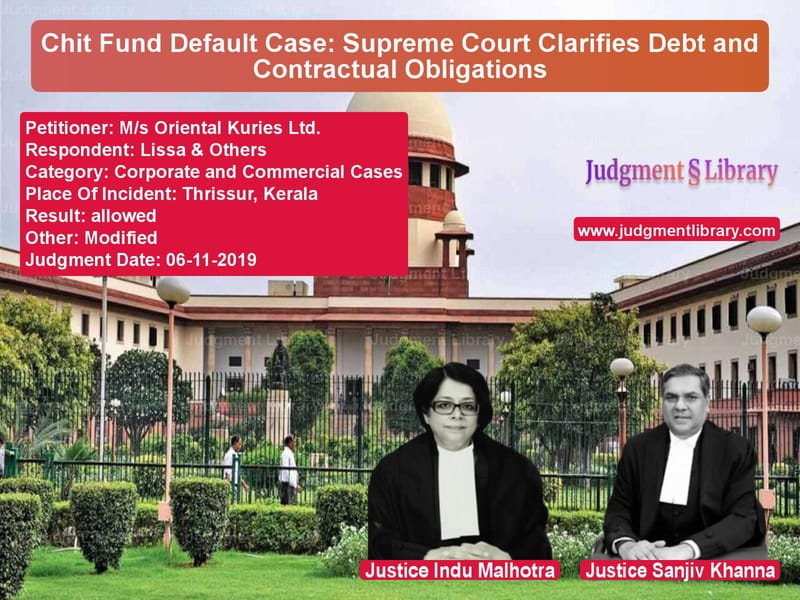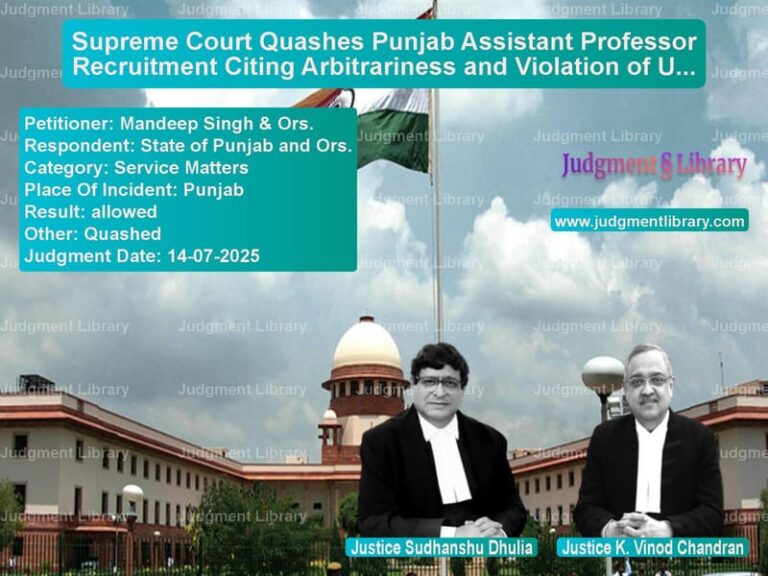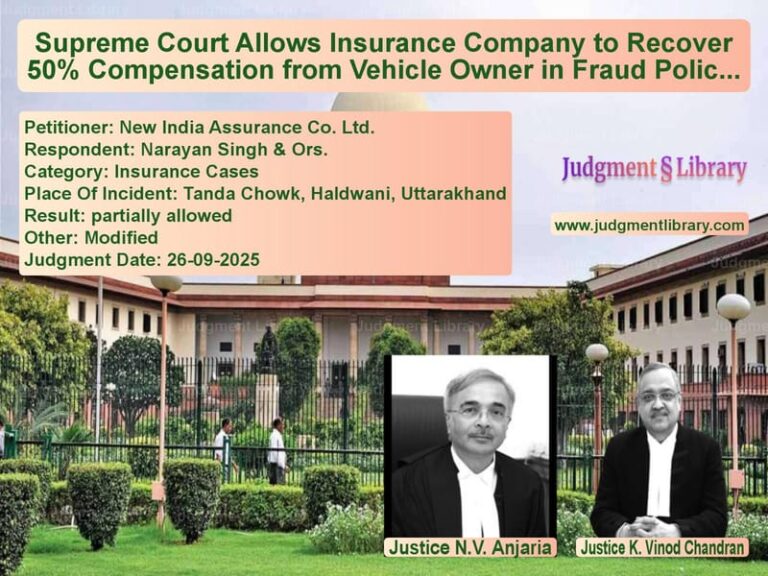Chit Fund Default Case: Supreme Court Clarifies Debt and Contractual Obligations
The case of M/s Oriental Kuries Ltd. vs. Lissa & Others revolves around a legal dispute concerning chit fund agreements and the liability of subscribers who default on payments. The Supreme Court was called upon to decide whether a chit fund creates a debtor-creditor relationship at the outset and whether a foreman is entitled to recover future installments in a lump sum upon default.
The judgment is significant in clarifying the legal nature of chit funds, distinguishing between a present debt and a future contractual obligation, and establishing the rights of the foreman in case of subscriber defaults.
Background of the Case
The case arose out of a chit fund operated by M/s Oriental Kuries Ltd., a registered chit fund company. The respondents were subscribers to the chit fund but defaulted on their payment obligations.
Key Events
- The chit fund operated between 1978 and 1990.
- The respondents defaulted on 12 installments between November 24, 1981, and November 24, 1984.
- The foreman, M/s Oriental Kuries Ltd., filed two suits for recovery:
- O.S. No. 323/1984: For recovery of the 12 defaulted installments.
- O.S. No. 548/1987: For recovery of future subscriptions due after November 24, 1984.
- The Subordinate Judge, Thrissur, ruled in favor of the chit fund company and decreed both suits on April 9, 1990.
Trial Court’s Judgment
- The respondents were ordered to pay Rs. 40,915 with interest for the first suit.
- For the second suit, the respondents were directed to pay Rs. 83,820.68 with interest.
High Court Proceedings
- The respondents appealed to the Kerala High Court, which upheld the trial court’s ruling.
- The Division Bench of the Kerala High Court subsequently overturned the earlier ruling, stating that future installments were not a debt but merely a contractual obligation.
- The High Court relied on the precedent set in Janardhana Mallan & Ors. v. Gangadharan & Ors. (AIR 1983 Ker 178), which held that a chit fund agreement does not create an immediate debt obligation.
Arguments Before the Supreme Court
Arguments by the Chit Fund Company
- Subscribers enter into a debt agreement upon signing the chit agreement.
- When a subscriber defaults, the foreman has the right to recover the full amount of future installments.
- The Division Bench of the High Court wrongly interpreted the legal nature of chit funds.
- The case should be decided in line with P.K. Achuthan & Anr. v. State Bank of Travancore, which held that a chit fund creates a present debt.
Arguments by the Respondents
- The chit fund agreement does not create an immediate debt.
- Future installments are merely a contractual obligation and cannot be recovered in advance.
- The judgment in Janardhana Mallan correctly distinguished between a present debt and a promise to pay.
Supreme Court’s Judgment
The Supreme Court ruled in favor of M/s Oriental Kuries Ltd., setting aside the Kerala High Court’s decision. The key findings were:
1. Chit Fund Creates a Present Debt
- The Court reaffirmed the ruling in P.K. Achuthan, holding that a chit fund creates a debtor-creditor relationship.
- The Court ruled:
“The subscriber incurs a debt upon entering into the chit agreement, and future installments are part of this debt.”
2. Foreman’s Right to Recover Future Installments
- The Court upheld the provision under the Chit Funds Act, 1982, which allows the foreman to recover future installments in a lump sum if a subscriber defaults.
- The Court ruled:
“In the event of default, the foreman is entitled to recover all outstanding installments as a consolidated sum.”
3. Division Bench of Kerala High Court Misinterpreted the Law
- The Court held that the Division Bench wrongly applied the ruling in Janardhana Mallan.
- The Supreme Court clarified:
“The promise to pay in installments does not change the nature of the debt incurred at the time of subscription.”
Impact of the Judgment
This ruling has important implications for chit fund operations in India:
- Chit Fund Subscribers Are Legally Bound: Upon subscription, a participant assumes a debt obligation for the full amount.
- Foreman’s Right to Recovery Strengthened: Chit fund companies can enforce their right to recover dues without waiting for each installment.
- Chit Funds Act, 1982, Reinforced: The judgment upholds the legal framework governing chit fund transactions.
Conclusion
The Supreme Court’s ruling in M/s Oriental Kuries Ltd. vs. Lissa & Others establishes that chit fund agreements create an immediate debtor-creditor relationship. By reinforcing the foreman’s right to recover defaulted installments, the judgment provides clarity for both chit fund operators and subscribers. This ruling ensures that the chit fund mechanism remains legally enforceable, thereby strengthening the financial credibility of such institutions.
Petitioner Name: M/s Oriental Kuries Ltd..Respondent Name: Lissa & Others.Judgment By: Justice Indu Malhotra, Justice Sanjiv Khanna.Place Of Incident: Thrissur, Kerala.Judgment Date: 06-11-2019.
Don’t miss out on the full details! Download the complete judgment in PDF format below and gain valuable insights instantly!
Download Judgment: Ms Oriental Kuries vs Lissa & Others Supreme Court of India Judgment Dated 06-11-2019.pdf
Direct Downlaod Judgment: Direct downlaod this Judgment
See all petitions in Company Law
See all petitions in Bankruptcy and Insolvency
See all petitions in unfair trade practices
See all petitions in Judgment by Indu Malhotra
See all petitions in Judgment by Sanjiv Khanna
See all petitions in allowed
See all petitions in Modified
See all petitions in supreme court of India judgments November 2019
See all petitions in 2019 judgments
See all posts in Corporate and Commercial Cases Category
See all allowed petitions in Corporate and Commercial Cases Category
See all Dismissed petitions in Corporate and Commercial Cases Category
See all partially allowed petitions in Corporate and Commercial Cases Category







